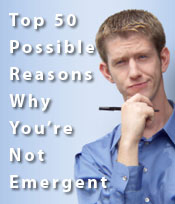
Bill Easum and Tony Jones are participating in a blogologue about the emerging church this month over at Emergent Village. I think this will likely be one of the more important dialogs for people to listen to regarding the Emerging Church movement. Much love to Bill for engaging that dialog with Tony.
The purpose of the blogologue can be found, in the words of Steve Knight,
“So we contacted Bill and asked him if he’d be willing to participated in a little “blogologue” (short for “blog dialogue”) with Tony Jones, discussing the questions/issues Bill has raised with Emergent. He quickly responded, Yes, and so here we are.
Easum’s first post can be found here. It is interesting to read a clear and concise perspective from someone who sees himself outside of an Emergent perspective and looking in. He makes a a surprising observation that I found fascinating and a few assumptions about Emergent that I didn’t agree with.
Easum’s New Metaphor: Easum offered a new metaphor for understanding the transition that I thought was brilliant. He essentially calls the modern world the National Park and the postmodern world a Jungle. I think this metaphor is one of the best I’ve seen. One suggests control while the other is wild and free. The first thing that came to mind when I read this is that as much as we want a National Park to live in, in doing so we inevitably tame God and lock Him up in a cage for people to gawk at. He becomes something we study, dissect, make assumptions about but inevitably think we control. The jungle metaphor appealed to me because God was likely around the next tree waiting to pounce on me like Aslan. He isn’t safe but He is good.
But this loss of control means letting go of some of our historical assumptions about the way we operate and engage mission. We’ve been a National Park for way too looooooooooong. But to simply live in a jungle after operating that way for centuries is very hard to do. Easum’s metaphor hopefully will make that transition easier.
Easum’s View Of Emergent’s Message: Easum offers an interesting view of what he thinks Emergents think. He says,
“Emergents will speak with passion and urgency but never with certainty. To them there is no certainty, only what one believes today, at this moment, in this locale.”
I think a better way to describe this is that Emergents are aware of our own limitations as human beings. Our own brokenness affects the very information we receive and perceive. We recognize that we live in language, are cognitive beings and that what we think today is based on limited information. This awareness leads to faith, which is holding onto the idea that God is really in control (a jungle) and to step away from trying to control the message (the National Park). The problem isn’t that truth exists but that certainty closes us down to learning and humility.
Easum also asks an important question.
“Is the message of the Gospel actual reality and eternally true, or is it nothing more than a construct of our own language within the community of faith at this particular time in history in this particular place with this particular community?”
Answering this question, I would hold, is central to understanding a postmodern, even an Emergent faith. That there is “no truth” is one of the great myths about the Emerging church movement. The answer is, “Yes, there is a truth.”
But the problem is that own humanity significantly taints that truth because we are cognitive and perceptual human beings. We were never meant to “judge” on our own. We were always designed to be in relationship with our Creator, as in the Garden State. The Tree of Knowledge was a judgment process. Humans became, “like one of us.” This wasn’t a good thing because humanity trusted in its own capacity to judge effectively. And we sucked at it.
The problem isn’t when we get it right, as in the disciples following Jesus. The problem is when we get it wrong, as in the Pharisees, the very one’s who were certain, who couldn’t see God standing in front of them. The Emergent movement and the postmodern world is coming to terms with that reality. We’re humans who filter truth.
History has been an unkind teacher in some ways. She has unfortunately revealed us when, where, and how we got it wrong. The Internet has allowed us to speed up that conversation, connect with like minds and discuss these issues. Blogs have allowed us to process new ideas, alternatives and possible new scenarios in lighting speed. What took ages before now takes minutes. And for some this shift seems disconcerting because they are not used to such a seismic shift. The truth is that we don’t live in an Intel 386 world anymore.
What is ironic about this whole point is that Emergents are the ones who are leading the conversation about coming to terms with our own humanity. This process of admitting our own limitations is essentially repentance and it is central to our own restoration as followers of Jesus.
Relativism: Bill comes very close, but to his credit doesn’t cross, the common excuse of pulling the relativism card. The temptation within this dialog is to simply excuse those in the Emergents as relativists, a cheap move from my perspective. It dismisses any further dialog because it excuses the other party from having to continue. But I would offer Bill that what is relative is not the truth but our perception of the truth. The evidence of this is obvious in science and in history, but apparently not in the church.
The evidence of this can be found in the points Bill is making. His judgments of the Emerging movement don’t resonate with me. Are they true? Yes, in that they are his judgments. Yet, they are not true for me because I don’t share his conclusions. Does that make us relative? No. It makes us human.
Easum on Methods: Bill does share a concern for how we move forward. He says,
“I agree with the authors that we can’t come on to postmoderns like gangbusters with an elitist attitude as if we have THE truth. I agree with them that the four spiritual laws no longer work. I agree with them that if we lead from the big story we are dead in the water. I agree with them (and with Frank Viola) that the distinction between clergy and laity is not biblical and shouldn’t exist. I agree with them that the new world sees everything in shades of gray.”
But he also says,
“But I do not agree that Christians must feel they have to be two steps removed from the reality of the Gospel in order to reach this new world. In fact, I think it is just the opposite. The clearer a leader is about the reality of Gospel and the direction of their calling, the more likely that person is to lead a growing and thriving community of faith.”
And this is where I see Easum perpetuating the myth that we are removed from the Gospel or that we don’t hold a Gospel. In fact, my wife and I have come to the conclusion that much of the dialog within the Emerging church movement is simply asking for a more wholistic approach to following Jesus and being the church…because we’re tired of this thing we grew up with called, “doing church”. We’re tried of simply being passive observers in the Christendom food chain.
To say that there hasn’t been problems in the past is to ignore the reality of the issues we face today. We are in this space because the church has ignored the road it went down. When more than 12 million people have left the church but not God the problem simply can’t be ignored.
Easum on New Organization: Bill states one thing that I found very sad because when I read it, it seems like a shout from the cheap seats. If he wants to be honest in the dialog, I would suggest he lose this conception. He says,
“They don’t even believe in planting churches in order to reach more people, nor do they believe in doing things to get people to come to their church. They plant churches only to save themselves, whatever that means.”
Again this is a myth. I personally know people who are taking very serious looks at what it means to be the church and organize around following Jesus into mission. The experimentation phase is just beginning. And many of these ideas are still in the birth, or even the infant stage. To say they don’t produce fruit yet is natural, but to say they don’t exist is to perpetuate a lie. And these ideas likely won’t look what we have right now and thus the myth will continue to be perpetuated. This leaves us in the Emerging church movement the task of coming up with clear, creative alternatives and seeing them to maturity. Nice.
Easum ends this section with a surprisingly honest assessment of where the church is at. He says,
“The Emergent movement is providing a marvelous conversation for all of us. They have revealed the naked truth—the emperor has no clothes. The established Christian church is basically dead and in need of A Second Resurrection.”
This is from a man who has spent his life studying the church. Right on Bill.
Bill does ask a series of question for the Emergents, which I will answer in the next post.
Much love to Bill for beginning a great dialog and I can’t wait to hear Tony’s response.
PS: Both Bill and Steve Knight responded in regard to my comments regarding what is essentially Tony’s quote from his book. I have responded in the comments that I got the context for this quote wrong, but I don’t like to edit original posts even when I get it wrong.
Read Full Post »


 If you live in Sacramento and want to join our cohort for an early evening of drinks tomorrow night in Roseville (Monday: 4-6 PM) with Mark Scandrette, feel free to join us. Go
If you live in Sacramento and want to join our cohort for an early evening of drinks tomorrow night in Roseville (Monday: 4-6 PM) with Mark Scandrette, feel free to join us. Go 















